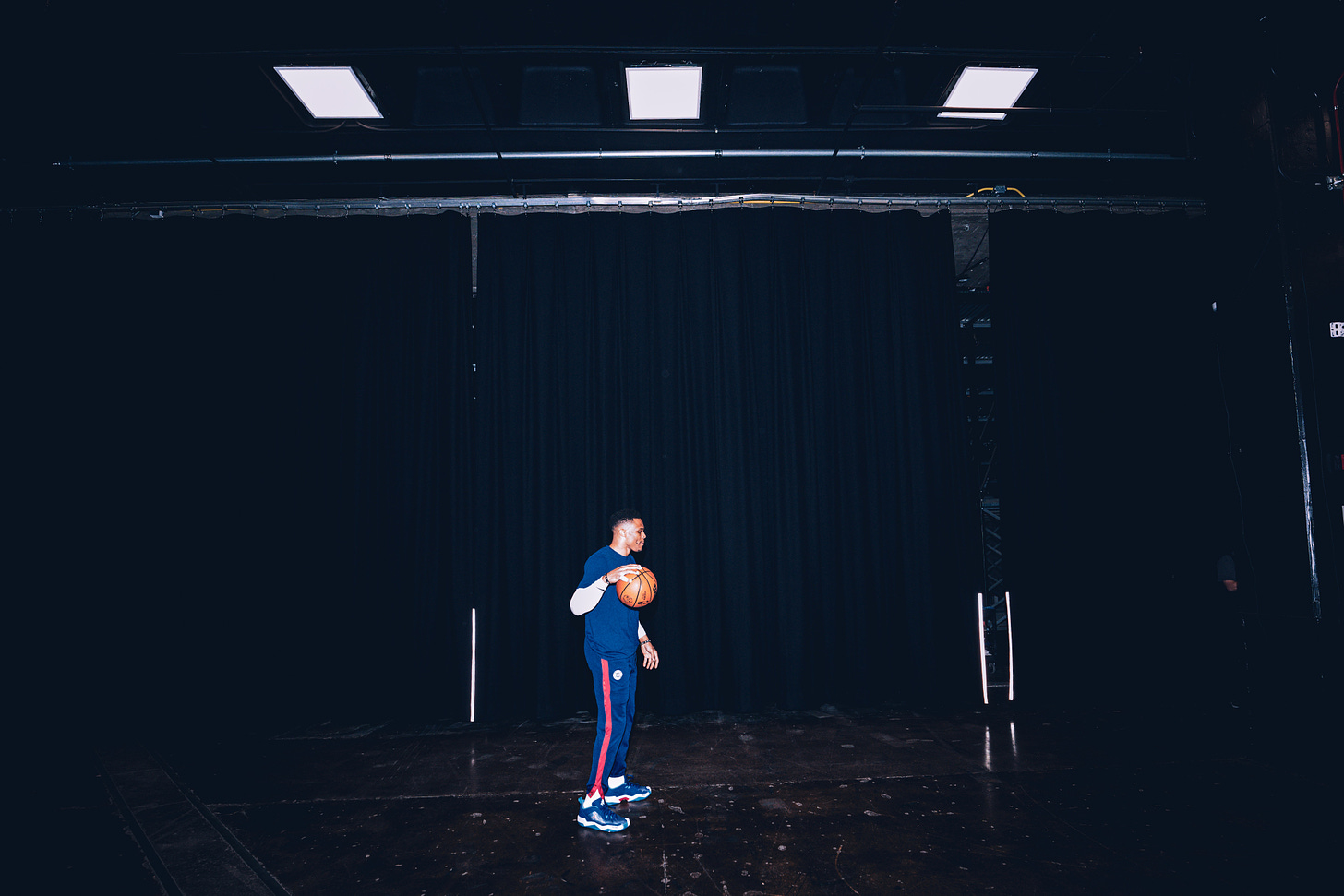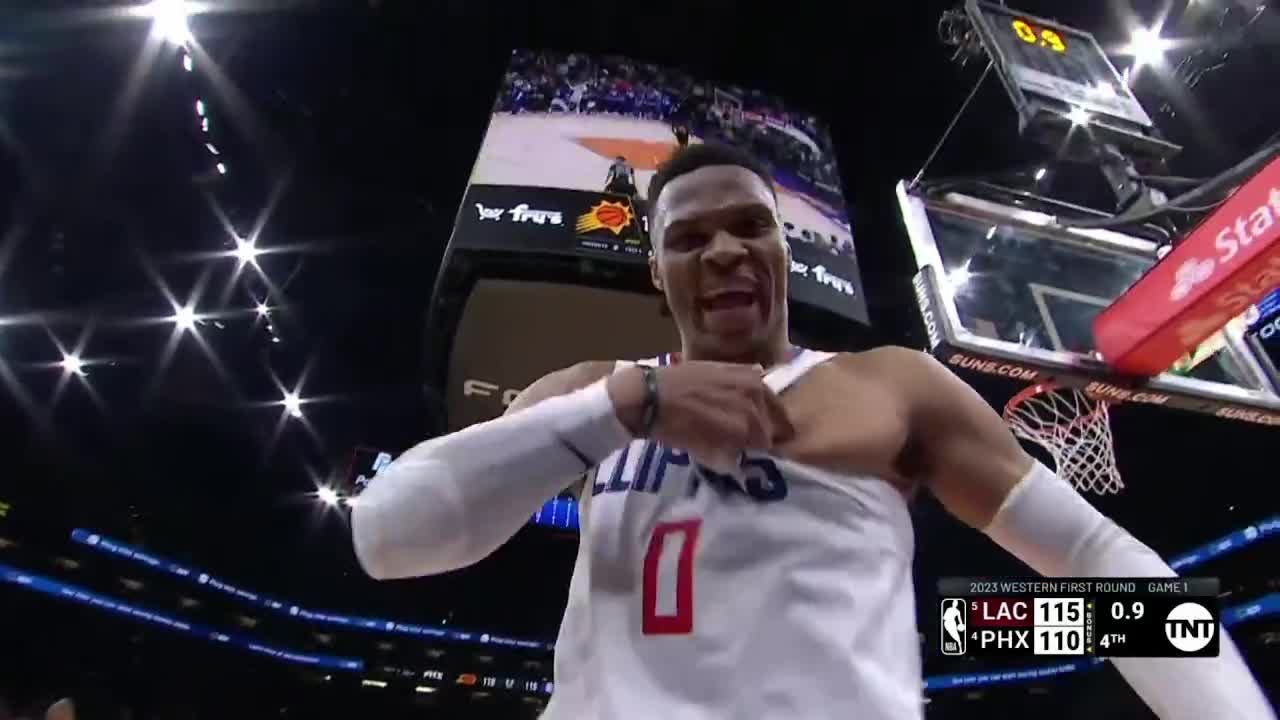Exits: God invents man
Writer John Saward on the inflection point of the Clippers' fallibility and the game-devouring event of Russell Westbrook in motion.
There is a sequence in Kevin Durant's first game back in Oklahoma City that I still think about, it plays in my head like a lonely cowboy song. The Thunder had been way behind for most of the game, but in the second half they hit a few shots, there was a whisper of a comeback, the Warriors called timeout. On the way to the bench Russell Westbrook looked over his shoulder as he passed Durant and kept shouting at him “I’M COMING.”
The Thunder were down 18. Durant shrugged his shoulders at Russ and held his palms up in a way that was like, dude what are you talking about, do you know the rules, have you seen the score, but Russ just keeps going, there is spit and sweat all over his mouth, he is nodding his head in these crazy snaps. I’M COMING, I’M COMING. Durant doesn’t really know what to say. It was like trying to explain the universe with science to someone who believes God invented man. Russ lost 130-114.
Durant won the championship that season and Russ lost in the first round in five games. For the next four years Golden State would be a rollicking caravan of killers whose only true rival was the periodic boredom of their own perfection. There are some basic basketball reasons why all of that happened, but there was a feeling back then that has only become sharper with time, that Russ is doomed to be only a crusading maniac in wars that cannot be won, that he will forever be just a rebel defending the last stronghold of strange, reckless magic in basketball as Big Analytics tidies up the fringes of its empire.
At some point during his MVP run, rejecting Russ came to mean that you had styled yourself as a cold-blooded basketball realist, that you could see through the theater and popcorn thrills of his game and call it what you believed it had secretly been all along: that he was catastrophically inefficient, that he was big budget chaos with no plot, that every Russ team was ruled despotically by his ego. He wanted it so bad, which everyone always loved, but they began to insist that he wanted it for the wrong reasons, that even him playing so hard was only so he might point to a ledger of ferocious micro triumphs and slam the gavel.
To reject Russ meant that you were above matters of the heart, that scorn and redemption and petty vendettas with Pat Beverely might feel good, but really they are just frivolous Hollywood contrivances, and in our culture we respect only profits and WINNERS. To reject Russ meant that you understood basketball in terms of plain economics, team building cheats and market inefficiencies. Maybe there were rare dunks and the brief, intense euphoria of watching a man turn a whole planet into his adversary, but spread over a season, thousands of tiny Russ Impulses were actually bad business, and if you found this appealing then you were just a child watching cartoons.
But, my god, those people are just not my people. I think they are of defective character. I think there is no formula that adequately captures "fuck it" when your team absolutely needs someone who would believe such a thing. I think Russ scoring 37 points two weeks ago against three of the best midrange shooters alive, without Kawhi Leonard or Paul George, and shoving the Clippers back into the game every time they began to teeter was not the gluttonous display of a man obsessed with valor but something close to emotional. The 2023 Clippers were not indestructible, but Russ seemed to be operated at all times by machinery that is.
In a season and a half with the Lakers, Russ had seen LeBron plot in broad daylight to have him traded. He’d seen one of his own coaches attempt to do the same. He’d seen every oafish maître‘d of the basketball media dole out anonymous stories about what a horrible person he was. He had felt the city he grew up in hate him so much that they developed a strange lust for his failure.
He was presented in every wincing TV broadcast interlude as the inevitable moment when a myth shatters and there is only a hero’s sad, desperate attempts to plumb the last drops of greatness from a barren earth. And everyone hated him for it, they hated him for trying. Lakers fans, basketball fans, pedantic podcasters, the content factories on Twitter that delighted in every clanked jump shot.
He seemed visibly torn between taking all the shots they were daring him to take (don't give up on yourself, Russ) and sullenly tossing it to LeBron (they said you won’t compromise, Russ). He seemed like he was running through all these hypothetical conversations in real time. He was stuck in an excruciating zone between the Zen Of Russ (sublime, cataclysmic, a high-speed chase for all eternity) and Fitting In At Work (miserable).
With him there is always evidence of any ongoing crisis. He would try to dunk on everyone, at any time, in sleepy matinee games in January. He once tried to dunk over Montrezl Harrell from two steps inside the foul line. He could sometimes be seen muttering to himself with gritted teeth after particularly disastrous turnovers. He will take off for a layup at full-speed and then decide abruptly, in mid-air, that he should pass it instead. All of it together is baffling, it is gorgeous, a constant tidal wave of anxiety. It can sometimes be bad and in hideous ways, it can look not only like a mistake but sort of a game-devouring event.
But there are also moments, like Game 1 against the Suns, when you watch him and realize that occasionally people might access via fear and madness a kind of super-focus, where all our ideas have tremendous power and clarity. It is my favorite TV show of all-time.
In the second half alone Russ was 1-10. He missed shots from every distance and in every manner. But then he would frantically hunt those misses, find an unguarded teammate in the disorder, set them up for an easy basket. And this seemed to gnaw at the Suns’ morale, the sheer audacity of Russ, to be so apocalyptically bad at shooting and yet refuse to be diminished by it. He airballed shots and then on the ensuing possessions chased Devin Booker the width of the court to poke the ball away from behind and start a fastbreak. He missed lay-ups and grabbed his own rebounds, he launched a 3 that hit a strange place of the backboard. He made perfect one-handed, mid-dribble passes across the court with the shot-clock dwindling. He could not be humiliated, and so he became almost invincible.
The whole game goes like this. A flood of misses, from the clumsy to the potentially-annihilating, the announcers somewhere between disgust and awe, “Westbrook forcing the issue here…He’s now two for 13 from the field.” The critics are home all licking their lips waiting for the collapse, “He has just been off on everything here tonight,” except the worse he shoots the more insane he gets; he shoots so bad he becomes the best player in the stadium, he is everywhere and he will not stop. He makes two free-throws with 17 seconds left like he was microwaving a cup of coffee. Devin Booker is heaving a hopeless layup at the rim and Russ is all the way up there too, he’s got his hand on it and tonight the ball’s not going to make it. Tonight fury defeats math, tonight God invents man.





Even if I wasn't a to-the-ends-of-the-earth westbrook defender, i would recognize this as one of the greatest basketball essays of all time.
"But, my god, those people are just not my people. I think they are of defective character." A-fuckin'-men!
Also, overall, this is a fantastic piece of writing.